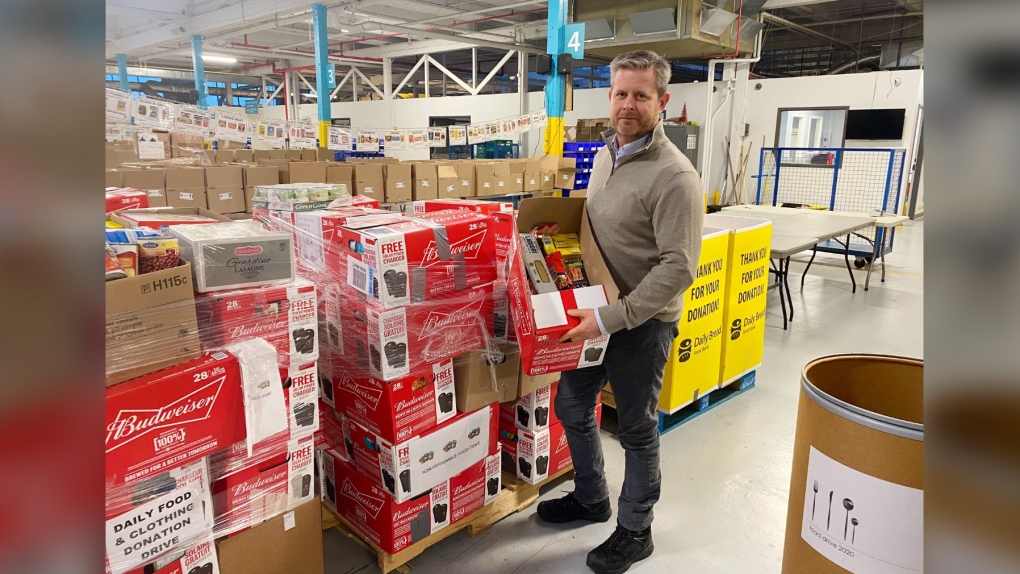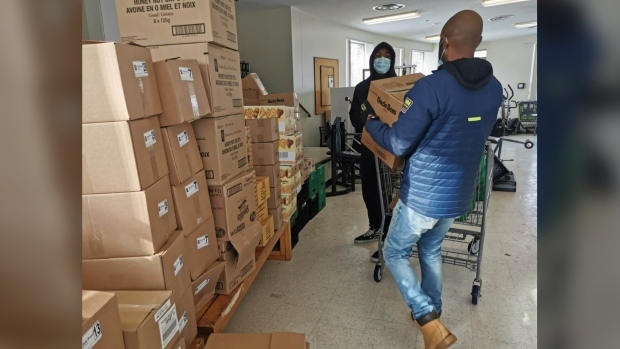Food banks in Toronto expect struggle to continue in 2023 as need grows
 Neil Hetherington is the CEO of the Daily Bread Food Bank. (Daily Bread Food Bank photo)
Neil Hetherington is the CEO of the Daily Bread Food Bank. (Daily Bread Food Bank photo)
Toronto’s Daily Bread Food Bank has reached a new milestone and no one is celebrating.
For the first time in the Canadian charity’s 40-year history, the south Etobicoke-based organization saw more than 200,000 client visits in one month.
In November, Daily Bread’s 126 member agencies recorded 208,108 monthly client visits. That’s more than triple pre-pandemic numbers. In late 2019, the average number of monthly client visits hit roughly 60,000, CEO Neil Hetherington told CP24.com.
“In our 40-year history we’ve never been anywhere close to this,” he said during a recent interview.
“Two years ago we weren’t even at 100,000 (monthly client visits). It’s absolutely unbelievable how high it is now.”
Further, the number of unique, new food bank clients is also expected to reach more than 80,000 by year’s end.
Aside from grappling with a significant spike in the number of people using food banks in the city, those who run them say the rising cost of food has also been a major challenge and there’s no sign of it getting better in the year to come.
According to Canada’s Food Price Report 2022, the overall cost of food is expected to increase by five to seven per cent in 2023. This is the highest predicted jump in food prices since the report’s inception 12 years ago.
“Before the pandemic, in 2019, we spent about $1.5 million on food. Our budget is now $18 million,” Hetherington said, adding the majority of the funds they raise go to buying food, leaving very little for administrative or operational expenses.
“We’ve had to get really creative,” he said, noting this year they looked at their heating system and reprogrammed it, which saved about $15,000. Those funds went directly to buying food.
Donations of essential items, like cardboard boxes also make a big difference as the Daily Bread goes through roughly 1,500 boxes every day.
Recently, they received a few skids of Budweiser beer boxes, which were used for food hampers throughout the GTA.
The Daily Bread has also started working with a cardboard recycling company that provides them with reused boxes.
“We’ve been looking for efficiencies all over the place. … We’re doing everything we can,” said Hetherington, adding they’re even considering purchasing some equipment to produce their own cardboard boxes, if it makes financial sense.
Many of the 200 or so food banks under the Daily Bread’s umbrella also face challenges with the cost of renting and maintaining their space, he noted, adding that’s why more than ever volunteers are essential to the successful operation of food banks.
Hetherington said the time and effort they give to help sort, package, and deliver food allows the handful of staff who work at most food banks to focus on navigating challenges and raising as much funds as possible.
“We really appreciate our volunteer power,” he said, noting in the end policy changes are needed so people don’t struggle so much to make ends meet and are forced to rely on food banks to eat.

Garth Soso, the founder and director, of east Toronto’s Soso World Ministries, has experienced firsthand the many of the challenges Hetherington speaks of.
Soso heads up a small team that runs three large food banks and roughly 10 food pantry programs throughout Scarborough. Food and grant money from the Daily Bread help keep them going.
“The operational side is really taxing for us. … There have been some months, some stretches where we were just on fumes,” he admitted, adding while they’ve been fortunate to secure free space through a partnership with Toronto Community Housing Corporation, it’s never 100 per cent secure.
Soso said before the pandemic they saw between 800 and 1,000 clients a week. These days, they serve upwards of 1,700.
Aside from trying to provide food for twice as many people, he said they must also contend with the rising cost of gas, bags and boxes, and food, not to mention ensuring there’s enough money left over to cover staff wages and liability insurance among other things.
Having a dedicated team of volunteers is imperative to the work they do, Soso said, as it allows his team to focus on the bigger picture like securing food and cash donations.
“We’re really rely on people giving their time and energy,” he said, admitting it’s an ongoing challenge to find and retain good volunteers.
Cash donations also go a long way, he noted, as they allow them to buy heathy, culturally-appropriate food their diverse clients want and need.
“A lot of ethnic families want fresh fruit and vegetables and things like Halal meat,” Soso said, adding they’re always grateful for food donations and will accept and distribute them to clients.
CTVNews.ca Top Stories

Islamic State-inspired driver expressed desire to kill before deadly New Orleans rampage, Biden says
A U.S. Army veteran driving a pickup truck that bore the flag of the Islamic State group wrought carnage on New Orleans' raucous New Year's celebration, killing 15 people as he steered around a police blockade and slammed into revellers before being shot dead by police.
Calgary woman was planning to leave husband when he killed her and her father, brother says
The brother of Ania Kaminski, who was murdered by her husband on Dec. 29, described her as one of the most amazing human beings in the world.
'Cash poor' businesswoman is worth at least $20M, can pay off mortgage debt, B.C. court rules
A Vancouver businesswoman who claimed to be too "cash poor" to pay off a roughly $3 million mortgage debt – despite having claimed a net worth in excess of $94 million as recently as 2018 – has been ordered to pay up.
Canadian man, 38, dies in avalanche in Utah mountains
Authorities in Utah say a Canadian man has died in an avalanche while snowboarding in the mountains near Salt Lake City.
An aspiring nurse, football star, single mother and father of 2 killed in New Orleans attack
Officials have not yet released the names of the 15 people killed in the New Orleans New Year's Day truck attack, but their families and friends have started sharing their stories.
Firework mortars, gas cannisters stuffed inside Tesla that exploded outside Trump's Las Vegas hotel
Firework mortars and camp fuel canisters were found stuffed into the back of the Tesla Cybertruck that exploded outside U.S. president-elect Donald Trump's Las Vegas hotel early Wednesday, killing a suspect inside the vehicle and sparking an intense investigation into possible terrorism.
Financial changes in Canada you should know about this year
There are a few changes in federal policies that could affect Canadians' finances in the new year.
Gypsy Rose Blanchard gives birth to her first baby
Gypsy Rose Blanchard, who became infamous due to her role in the killing of her abusive mother, has given birth to her first child.
Watch The next big thing in AI in 2025, according to one tech analyst
Artificial intelligence isn't done disrupting our lives and compromising online safety, tech analyst Carmi Levy says.































